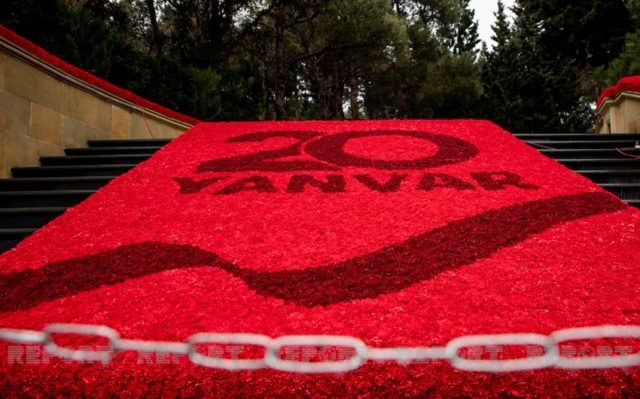Today marks 32 years since January 20, 1990, which entered the history of Azerbaijan as the Black January tragedy, Report informs.
The so-called Nagorno-Karabakh problem, which re-emerged in late 1987, was aimed at violating the territorial integrity of Azerbaijan, occupying its lands and expelling hundreds of thousands of Azerbaijanis living in Armenia and Nagorno-Karabakh. This conflict between the two republics of the former Soviet Union was the next stage in the policy of ethnic cleansing and genocide against Azerbaijani people, as well as the consistent settlement of Armenians in Azerbaijan in the XIX-XX centuries.
The direct or indirect support of the USSR leadership to the territorial claims of the Armenian SSR, separatism instigated by radical Armenian nationalists and mass violence against Azerbaijanis, as well as the criminal indecision of the then leaders of Azerbaijan and steps contrary to national interests pushed the Azerbaijani people to stand up for the protection of the territorial integrity of their country.
Thus, a broad-spectrum social movement emerged in Azerbaijan, and the course of the process laid the foundation for its gradual transformation into a national liberation movement.
Concerned that the Azerbaijani people were trying to get rid of the shackles of the empire by raising their voices for justice, the USSR leadership committed a terrible crime that accelerated the collapse of the Soviet totalitarian regime. On the night of January 19-20, 1990, the central government imposed a state of emergency in Baku without warning the population, in complete violation of international law and the country’s laws.
Hundreds of civilians were killed, wounded and missing in the Azerbaijani capital as a result of military aggression involving Soviet Army units, special forces, a large contingent of internal troops and even reservists from other Armenian-populated regions of the USSR. The next day after the massacre, on January 21, the great son of the Azerbaijani people, Heydar Aliyev, headed to the Permanent Mission of Azerbaijan in Moscow and issued a statement strongly condemning the USSR government and the incompetent leadership of Azerbaijan, which committed a massacre in Baku. The progressive forces of the world also strongly condemned this terrible and ruthless terror inflicted on the Azerbaijani people.
Only a few years later, at the initiative of national leader Heydar Aliyev, a political and legal assessment was given to the tragedy in Azerbaijan, which was not thoroughly investigated in time and did not receive an adequate assessment. The Decree of the President of the Republic of Azerbaijan “On holding the 4th anniversary of the January 20 tragedy” dated January 5, 1994 recommended the Milli Majlis of the Republic of Azerbaijan to consider the issue of holding a special session on the Bloody January events. The decision of the Milli Majlis on March 29, 1994, specifically identified the perpetrators of the January 20 tragedy and assessed this bloody action as military aggression and crime committed by the totalitarian communist regime to stifle the national liberation movement in Azerbaijan and break the trust and will of the people.
On January 20, 1990, the people of Azerbaijan gave many martyrs for their freedom and independence. However, its will was not broken and its national spirit was not shaken. The sons of the Fatherland, who sacrificed their lives to protect national interests during the massacre and rose to the peak of martyrdom, wrote a new bright page in the heroic annals of the Azerbaijani people with their matchless sacrifices.
Every year, January 20 is commemorated in Azerbaijan as the National Day of Mourning.







